Marketing Across Cultures: Vodafone's Strategy in UK and Africa
VerifiedAdded on 2023/01/18
|11
|3770
|66
Report
AI Summary
This report provides a cross-cultural analysis of Vodafone's marketing strategies, comparing the UK and African markets. It utilizes Hofstede's cultural model to examine cultural dimensions and their impact on marketing activities, including power distance, individualism, and uncertainty avoidance. The report analyzes social and cultural factors and their influence on the marketing mix (product, price, promotion) and consumer behavior in both regions. Furthermore, it explores various market entry strategies suitable for Vodafone's expansion in Africa. The analysis highlights the importance of adapting marketing approaches to align with cultural differences and leveraging strategic implications for business success.
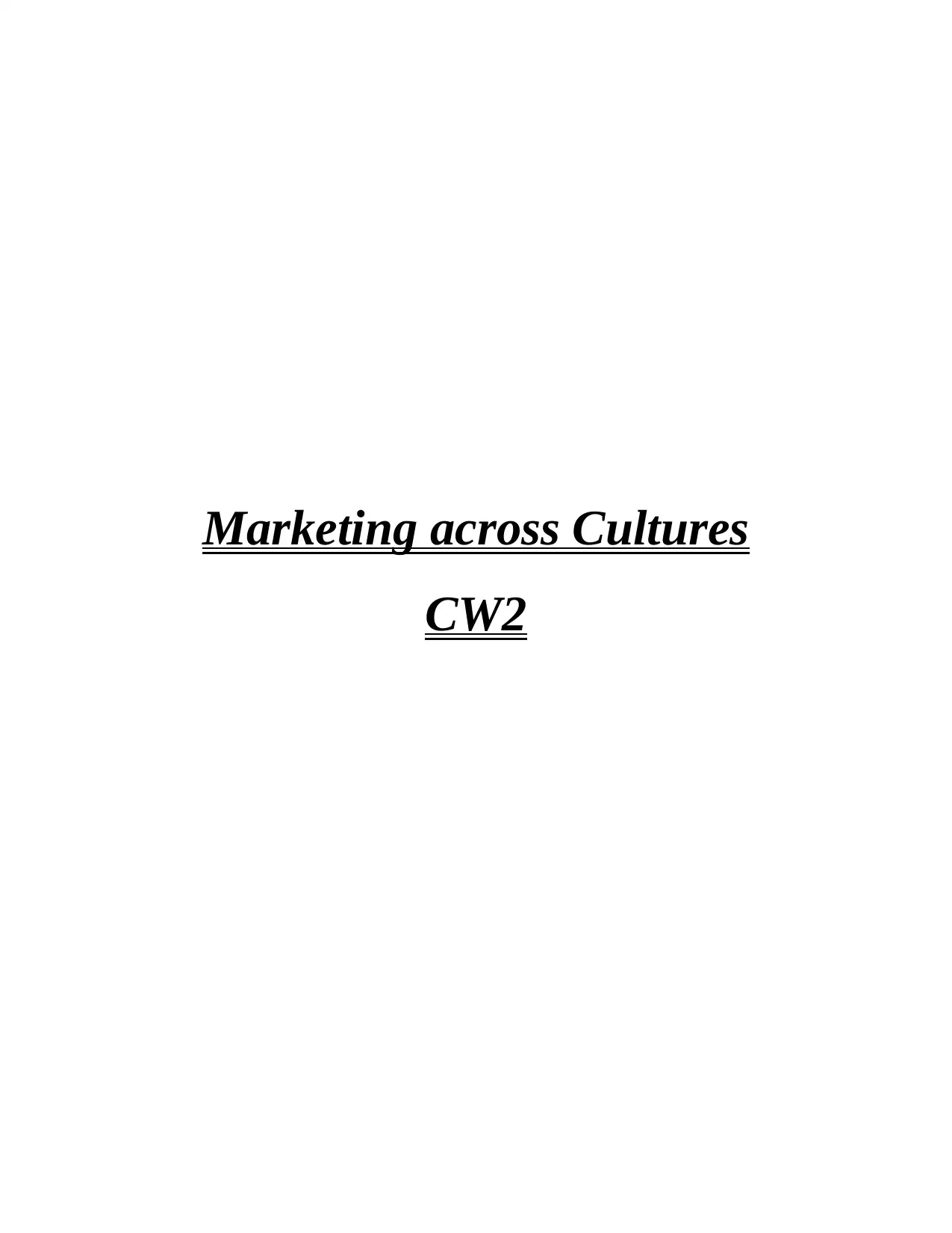
Marketing across Cultures
CW2
CW2
Paraphrase This Document
Need a fresh take? Get an instant paraphrase of this document with our AI Paraphraser
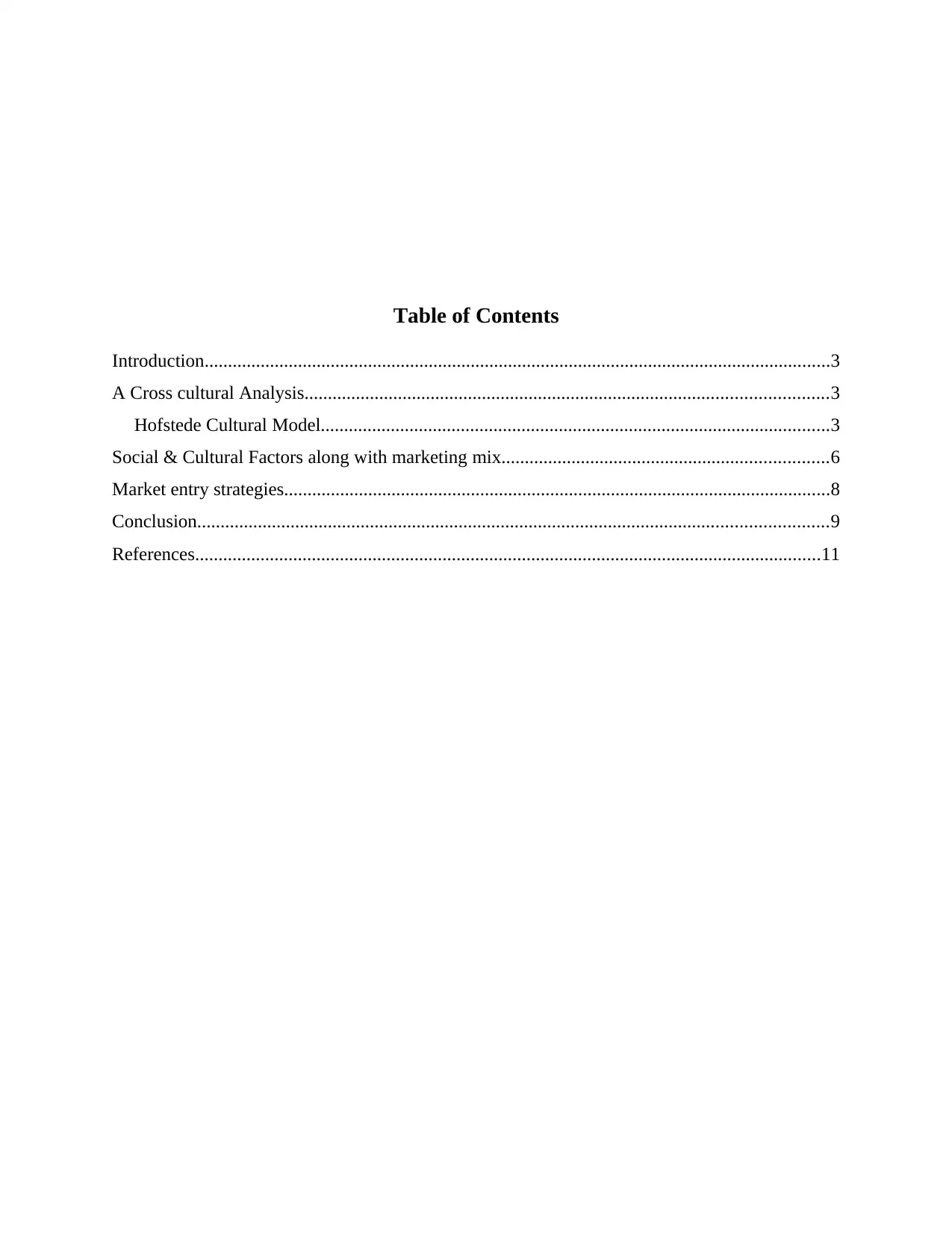
Table of Contents
Introduction......................................................................................................................................3
A Cross cultural Analysis................................................................................................................3
Hofstede Cultural Model.............................................................................................................3
Social & Cultural Factors along with marketing mix......................................................................6
Market entry strategies.....................................................................................................................8
Conclusion.......................................................................................................................................9
References......................................................................................................................................11
Introduction......................................................................................................................................3
A Cross cultural Analysis................................................................................................................3
Hofstede Cultural Model.............................................................................................................3
Social & Cultural Factors along with marketing mix......................................................................6
Market entry strategies.....................................................................................................................8
Conclusion.......................................................................................................................................9
References......................................................................................................................................11
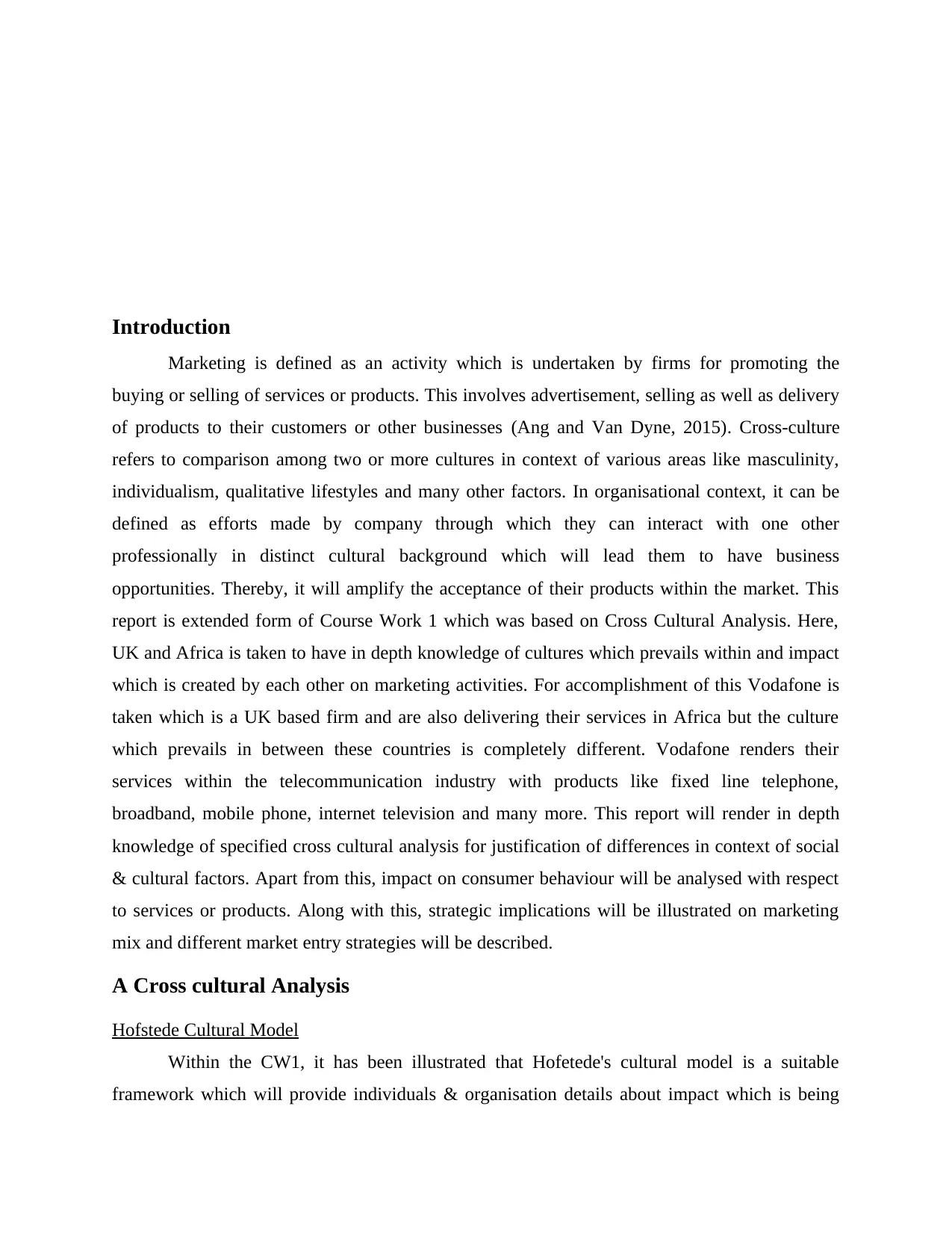
Introduction
Marketing is defined as an activity which is undertaken by firms for promoting the
buying or selling of services or products. This involves advertisement, selling as well as delivery
of products to their customers or other businesses (Ang and Van Dyne, 2015). Cross-culture
refers to comparison among two or more cultures in context of various areas like masculinity,
individualism, qualitative lifestyles and many other factors. In organisational context, it can be
defined as efforts made by company through which they can interact with one other
professionally in distinct cultural background which will lead them to have business
opportunities. Thereby, it will amplify the acceptance of their products within the market. This
report is extended form of Course Work 1 which was based on Cross Cultural Analysis. Here,
UK and Africa is taken to have in depth knowledge of cultures which prevails within and impact
which is created by each other on marketing activities. For accomplishment of this Vodafone is
taken which is a UK based firm and are also delivering their services in Africa but the culture
which prevails in between these countries is completely different. Vodafone renders their
services within the telecommunication industry with products like fixed line telephone,
broadband, mobile phone, internet television and many more. This report will render in depth
knowledge of specified cross cultural analysis for justification of differences in context of social
& cultural factors. Apart from this, impact on consumer behaviour will be analysed with respect
to services or products. Along with this, strategic implications will be illustrated on marketing
mix and different market entry strategies will be described.
A Cross cultural Analysis
Hofstede Cultural Model
Within the CW1, it has been illustrated that Hofetede's cultural model is a suitable
framework which will provide individuals & organisation details about impact which is being
Marketing is defined as an activity which is undertaken by firms for promoting the
buying or selling of services or products. This involves advertisement, selling as well as delivery
of products to their customers or other businesses (Ang and Van Dyne, 2015). Cross-culture
refers to comparison among two or more cultures in context of various areas like masculinity,
individualism, qualitative lifestyles and many other factors. In organisational context, it can be
defined as efforts made by company through which they can interact with one other
professionally in distinct cultural background which will lead them to have business
opportunities. Thereby, it will amplify the acceptance of their products within the market. This
report is extended form of Course Work 1 which was based on Cross Cultural Analysis. Here,
UK and Africa is taken to have in depth knowledge of cultures which prevails within and impact
which is created by each other on marketing activities. For accomplishment of this Vodafone is
taken which is a UK based firm and are also delivering their services in Africa but the culture
which prevails in between these countries is completely different. Vodafone renders their
services within the telecommunication industry with products like fixed line telephone,
broadband, mobile phone, internet television and many more. This report will render in depth
knowledge of specified cross cultural analysis for justification of differences in context of social
& cultural factors. Apart from this, impact on consumer behaviour will be analysed with respect
to services or products. Along with this, strategic implications will be illustrated on marketing
mix and different market entry strategies will be described.
A Cross cultural Analysis
Hofstede Cultural Model
Within the CW1, it has been illustrated that Hofetede's cultural model is a suitable
framework which will provide individuals & organisation details about impact which is being
⊘ This is a preview!⊘
Do you want full access?
Subscribe today to unlock all pages.

Trusted by 1+ million students worldwide
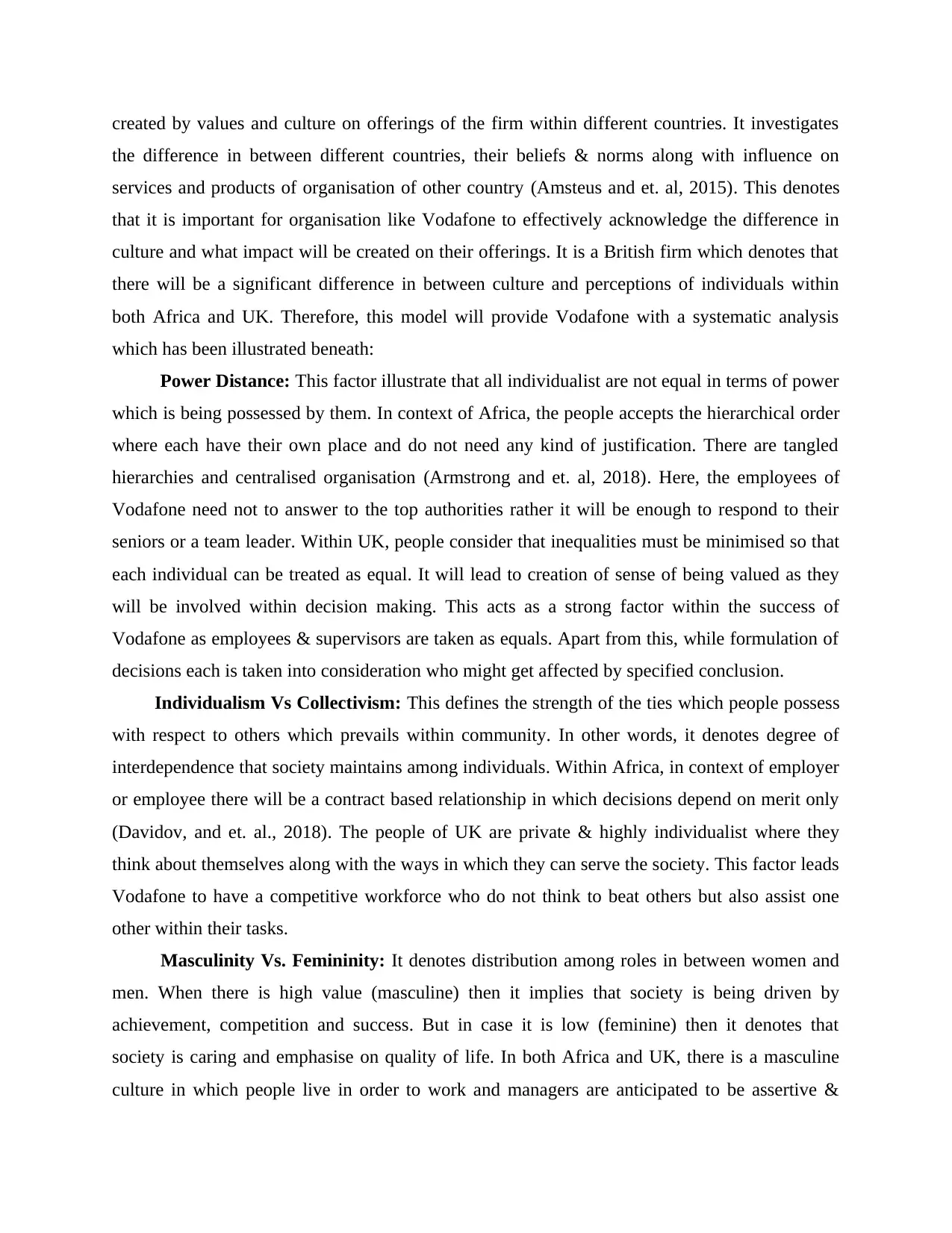
created by values and culture on offerings of the firm within different countries. It investigates
the difference in between different countries, their beliefs & norms along with influence on
services and products of organisation of other country (Amsteus and et. al, 2015). This denotes
that it is important for organisation like Vodafone to effectively acknowledge the difference in
culture and what impact will be created on their offerings. It is a British firm which denotes that
there will be a significant difference in between culture and perceptions of individuals within
both Africa and UK. Therefore, this model will provide Vodafone with a systematic analysis
which has been illustrated beneath:
Power Distance: This factor illustrate that all individualist are not equal in terms of power
which is being possessed by them. In context of Africa, the people accepts the hierarchical order
where each have their own place and do not need any kind of justification. There are tangled
hierarchies and centralised organisation (Armstrong and et. al, 2018). Here, the employees of
Vodafone need not to answer to the top authorities rather it will be enough to respond to their
seniors or a team leader. Within UK, people consider that inequalities must be minimised so that
each individual can be treated as equal. It will lead to creation of sense of being valued as they
will be involved within decision making. This acts as a strong factor within the success of
Vodafone as employees & supervisors are taken as equals. Apart from this, while formulation of
decisions each is taken into consideration who might get affected by specified conclusion.
Individualism Vs Collectivism: This defines the strength of the ties which people possess
with respect to others which prevails within community. In other words, it denotes degree of
interdependence that society maintains among individuals. Within Africa, in context of employer
or employee there will be a contract based relationship in which decisions depend on merit only
(Davidov, and et. al., 2018). The people of UK are private & highly individualist where they
think about themselves along with the ways in which they can serve the society. This factor leads
Vodafone to have a competitive workforce who do not think to beat others but also assist one
other within their tasks.
Masculinity Vs. Femininity: It denotes distribution among roles in between women and
men. When there is high value (masculine) then it implies that society is being driven by
achievement, competition and success. But in case it is low (feminine) then it denotes that
society is caring and emphasise on quality of life. In both Africa and UK, there is a masculine
culture in which people live in order to work and managers are anticipated to be assertive &
the difference in between different countries, their beliefs & norms along with influence on
services and products of organisation of other country (Amsteus and et. al, 2015). This denotes
that it is important for organisation like Vodafone to effectively acknowledge the difference in
culture and what impact will be created on their offerings. It is a British firm which denotes that
there will be a significant difference in between culture and perceptions of individuals within
both Africa and UK. Therefore, this model will provide Vodafone with a systematic analysis
which has been illustrated beneath:
Power Distance: This factor illustrate that all individualist are not equal in terms of power
which is being possessed by them. In context of Africa, the people accepts the hierarchical order
where each have their own place and do not need any kind of justification. There are tangled
hierarchies and centralised organisation (Armstrong and et. al, 2018). Here, the employees of
Vodafone need not to answer to the top authorities rather it will be enough to respond to their
seniors or a team leader. Within UK, people consider that inequalities must be minimised so that
each individual can be treated as equal. It will lead to creation of sense of being valued as they
will be involved within decision making. This acts as a strong factor within the success of
Vodafone as employees & supervisors are taken as equals. Apart from this, while formulation of
decisions each is taken into consideration who might get affected by specified conclusion.
Individualism Vs Collectivism: This defines the strength of the ties which people possess
with respect to others which prevails within community. In other words, it denotes degree of
interdependence that society maintains among individuals. Within Africa, in context of employer
or employee there will be a contract based relationship in which decisions depend on merit only
(Davidov, and et. al., 2018). The people of UK are private & highly individualist where they
think about themselves along with the ways in which they can serve the society. This factor leads
Vodafone to have a competitive workforce who do not think to beat others but also assist one
other within their tasks.
Masculinity Vs. Femininity: It denotes distribution among roles in between women and
men. When there is high value (masculine) then it implies that society is being driven by
achievement, competition and success. But in case it is low (feminine) then it denotes that
society is caring and emphasise on quality of life. In both Africa and UK, there is a masculine
culture in which people live in order to work and managers are anticipated to be assertive &
Paraphrase This Document
Need a fresh take? Get an instant paraphrase of this document with our AI Paraphraser
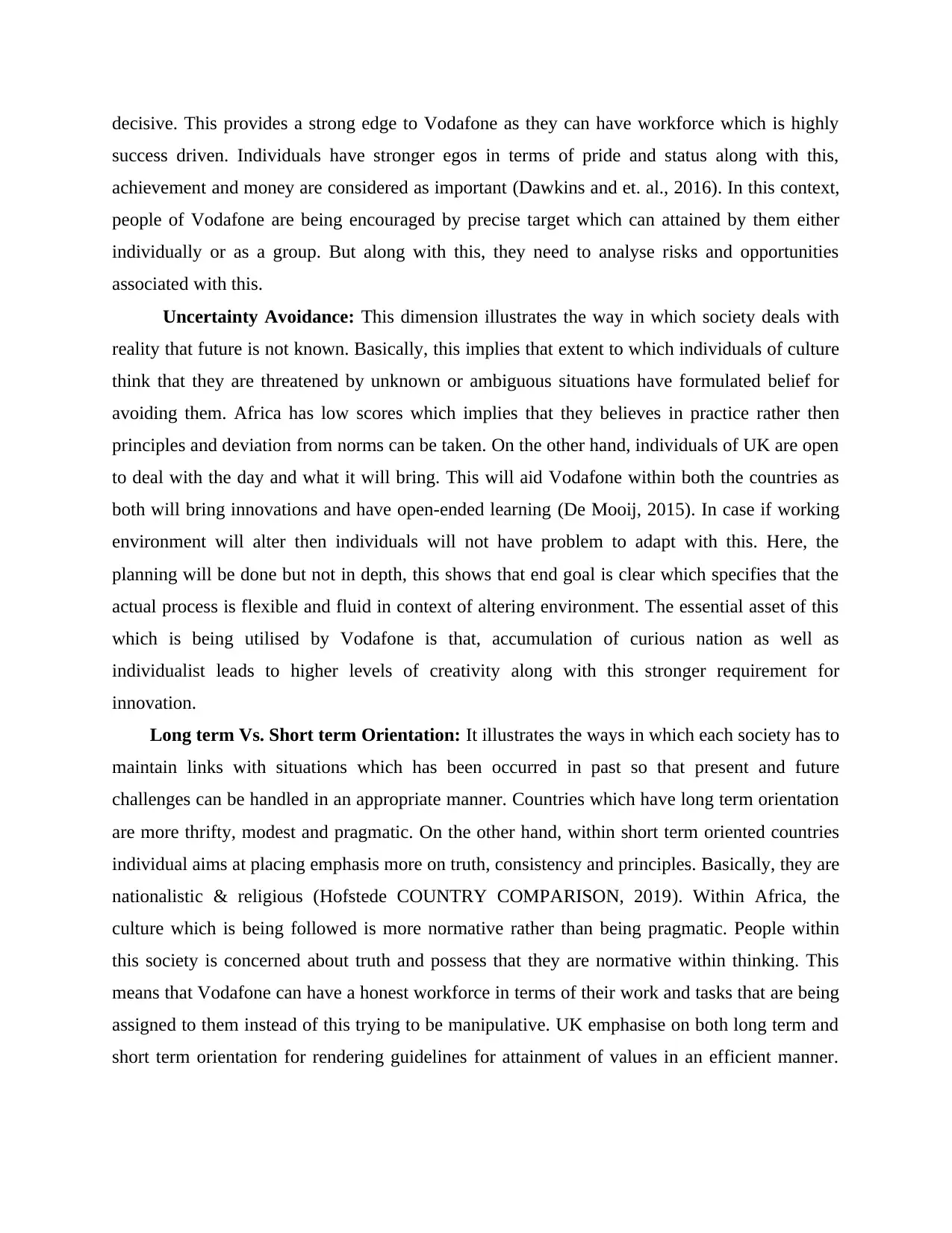
decisive. This provides a strong edge to Vodafone as they can have workforce which is highly
success driven. Individuals have stronger egos in terms of pride and status along with this,
achievement and money are considered as important (Dawkins and et. al., 2016). In this context,
people of Vodafone are being encouraged by precise target which can attained by them either
individually or as a group. But along with this, they need to analyse risks and opportunities
associated with this.
Uncertainty Avoidance: This dimension illustrates the way in which society deals with
reality that future is not known. Basically, this implies that extent to which individuals of culture
think that they are threatened by unknown or ambiguous situations have formulated belief for
avoiding them. Africa has low scores which implies that they believes in practice rather then
principles and deviation from norms can be taken. On the other hand, individuals of UK are open
to deal with the day and what it will bring. This will aid Vodafone within both the countries as
both will bring innovations and have open-ended learning (De Mooij, 2015). In case if working
environment will alter then individuals will not have problem to adapt with this. Here, the
planning will be done but not in depth, this shows that end goal is clear which specifies that the
actual process is flexible and fluid in context of altering environment. The essential asset of this
which is being utilised by Vodafone is that, accumulation of curious nation as well as
individualist leads to higher levels of creativity along with this stronger requirement for
innovation.
Long term Vs. Short term Orientation: It illustrates the ways in which each society has to
maintain links with situations which has been occurred in past so that present and future
challenges can be handled in an appropriate manner. Countries which have long term orientation
are more thrifty, modest and pragmatic. On the other hand, within short term oriented countries
individual aims at placing emphasis more on truth, consistency and principles. Basically, they are
nationalistic & religious (Hofstede COUNTRY COMPARISON, 2019). Within Africa, the
culture which is being followed is more normative rather than being pragmatic. People within
this society is concerned about truth and possess that they are normative within thinking. This
means that Vodafone can have a honest workforce in terms of their work and tasks that are being
assigned to them instead of this trying to be manipulative. UK emphasise on both long term and
short term orientation for rendering guidelines for attainment of values in an efficient manner.
success driven. Individuals have stronger egos in terms of pride and status along with this,
achievement and money are considered as important (Dawkins and et. al., 2016). In this context,
people of Vodafone are being encouraged by precise target which can attained by them either
individually or as a group. But along with this, they need to analyse risks and opportunities
associated with this.
Uncertainty Avoidance: This dimension illustrates the way in which society deals with
reality that future is not known. Basically, this implies that extent to which individuals of culture
think that they are threatened by unknown or ambiguous situations have formulated belief for
avoiding them. Africa has low scores which implies that they believes in practice rather then
principles and deviation from norms can be taken. On the other hand, individuals of UK are open
to deal with the day and what it will bring. This will aid Vodafone within both the countries as
both will bring innovations and have open-ended learning (De Mooij, 2015). In case if working
environment will alter then individuals will not have problem to adapt with this. Here, the
planning will be done but not in depth, this shows that end goal is clear which specifies that the
actual process is flexible and fluid in context of altering environment. The essential asset of this
which is being utilised by Vodafone is that, accumulation of curious nation as well as
individualist leads to higher levels of creativity along with this stronger requirement for
innovation.
Long term Vs. Short term Orientation: It illustrates the ways in which each society has to
maintain links with situations which has been occurred in past so that present and future
challenges can be handled in an appropriate manner. Countries which have long term orientation
are more thrifty, modest and pragmatic. On the other hand, within short term oriented countries
individual aims at placing emphasis more on truth, consistency and principles. Basically, they are
nationalistic & religious (Hofstede COUNTRY COMPARISON, 2019). Within Africa, the
culture which is being followed is more normative rather than being pragmatic. People within
this society is concerned about truth and possess that they are normative within thinking. This
means that Vodafone can have a honest workforce in terms of their work and tasks that are being
assigned to them instead of this trying to be manipulative. UK emphasise on both long term and
short term orientation for rendering guidelines for attainment of values in an efficient manner.
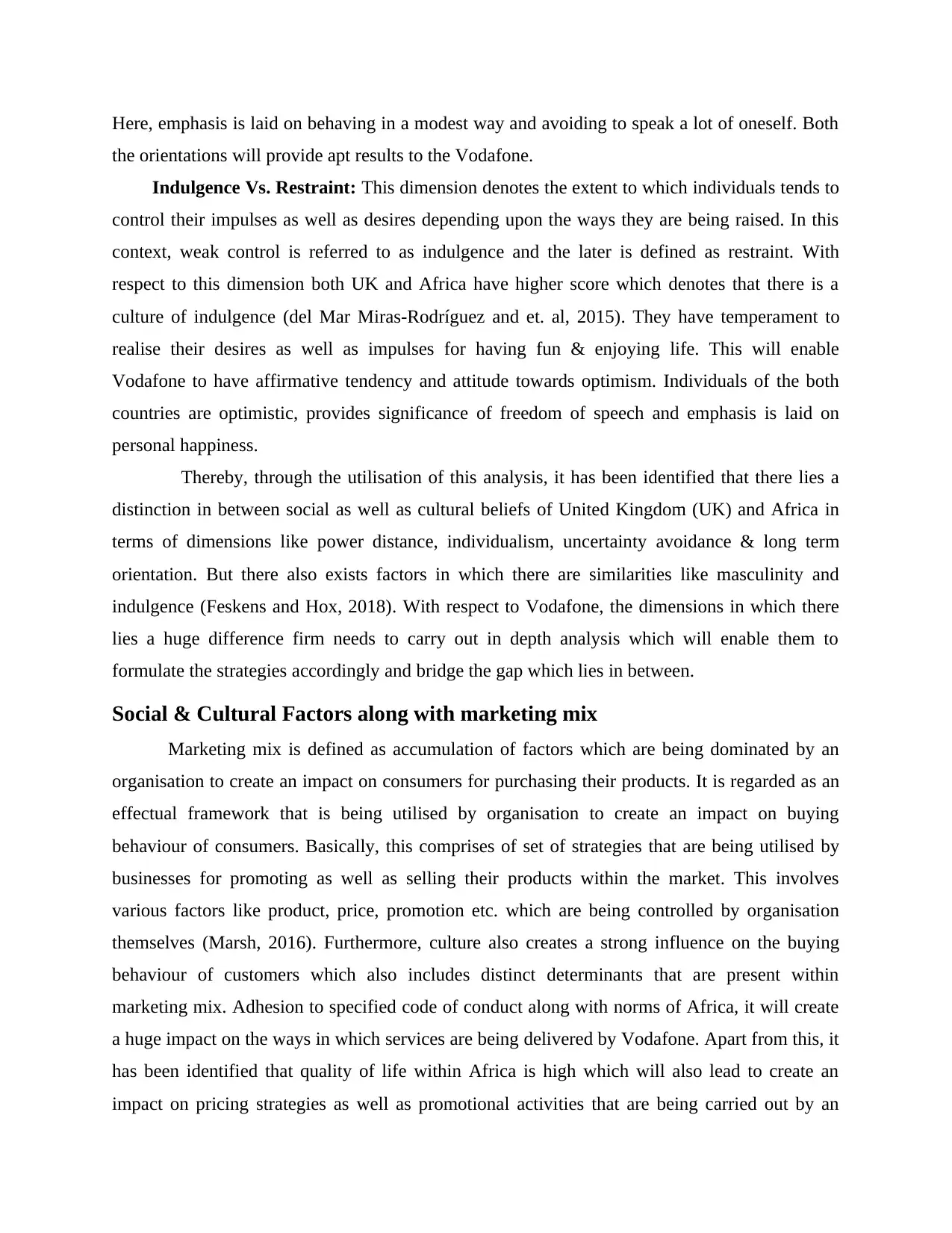
Here, emphasis is laid on behaving in a modest way and avoiding to speak a lot of oneself. Both
the orientations will provide apt results to the Vodafone.
Indulgence Vs. Restraint: This dimension denotes the extent to which individuals tends to
control their impulses as well as desires depending upon the ways they are being raised. In this
context, weak control is referred to as indulgence and the later is defined as restraint. With
respect to this dimension both UK and Africa have higher score which denotes that there is a
culture of indulgence (del Mar Miras‐Rodríguez and et. al, 2015). They have temperament to
realise their desires as well as impulses for having fun & enjoying life. This will enable
Vodafone to have affirmative tendency and attitude towards optimism. Individuals of the both
countries are optimistic, provides significance of freedom of speech and emphasis is laid on
personal happiness.
Thereby, through the utilisation of this analysis, it has been identified that there lies a
distinction in between social as well as cultural beliefs of United Kingdom (UK) and Africa in
terms of dimensions like power distance, individualism, uncertainty avoidance & long term
orientation. But there also exists factors in which there are similarities like masculinity and
indulgence (Feskens and Hox, 2018). With respect to Vodafone, the dimensions in which there
lies a huge difference firm needs to carry out in depth analysis which will enable them to
formulate the strategies accordingly and bridge the gap which lies in between.
Social & Cultural Factors along with marketing mix
Marketing mix is defined as accumulation of factors which are being dominated by an
organisation to create an impact on consumers for purchasing their products. It is regarded as an
effectual framework that is being utilised by organisation to create an impact on buying
behaviour of consumers. Basically, this comprises of set of strategies that are being utilised by
businesses for promoting as well as selling their products within the market. This involves
various factors like product, price, promotion etc. which are being controlled by organisation
themselves (Marsh, 2016). Furthermore, culture also creates a strong influence on the buying
behaviour of customers which also includes distinct determinants that are present within
marketing mix. Adhesion to specified code of conduct along with norms of Africa, it will create
a huge impact on the ways in which services are being delivered by Vodafone. Apart from this, it
has been identified that quality of life within Africa is high which will also lead to create an
impact on pricing strategies as well as promotional activities that are being carried out by an
the orientations will provide apt results to the Vodafone.
Indulgence Vs. Restraint: This dimension denotes the extent to which individuals tends to
control their impulses as well as desires depending upon the ways they are being raised. In this
context, weak control is referred to as indulgence and the later is defined as restraint. With
respect to this dimension both UK and Africa have higher score which denotes that there is a
culture of indulgence (del Mar Miras‐Rodríguez and et. al, 2015). They have temperament to
realise their desires as well as impulses for having fun & enjoying life. This will enable
Vodafone to have affirmative tendency and attitude towards optimism. Individuals of the both
countries are optimistic, provides significance of freedom of speech and emphasis is laid on
personal happiness.
Thereby, through the utilisation of this analysis, it has been identified that there lies a
distinction in between social as well as cultural beliefs of United Kingdom (UK) and Africa in
terms of dimensions like power distance, individualism, uncertainty avoidance & long term
orientation. But there also exists factors in which there are similarities like masculinity and
indulgence (Feskens and Hox, 2018). With respect to Vodafone, the dimensions in which there
lies a huge difference firm needs to carry out in depth analysis which will enable them to
formulate the strategies accordingly and bridge the gap which lies in between.
Social & Cultural Factors along with marketing mix
Marketing mix is defined as accumulation of factors which are being dominated by an
organisation to create an impact on consumers for purchasing their products. It is regarded as an
effectual framework that is being utilised by organisation to create an impact on buying
behaviour of consumers. Basically, this comprises of set of strategies that are being utilised by
businesses for promoting as well as selling their products within the market. This involves
various factors like product, price, promotion etc. which are being controlled by organisation
themselves (Marsh, 2016). Furthermore, culture also creates a strong influence on the buying
behaviour of customers which also includes distinct determinants that are present within
marketing mix. Adhesion to specified code of conduct along with norms of Africa, it will create
a huge impact on the ways in which services are being delivered by Vodafone. Apart from this, it
has been identified that quality of life within Africa is high which will also lead to create an
impact on pricing strategies as well as promotional activities that are being carried out by an
⊘ This is a preview!⊘
Do you want full access?
Subscribe today to unlock all pages.

Trusted by 1+ million students worldwide
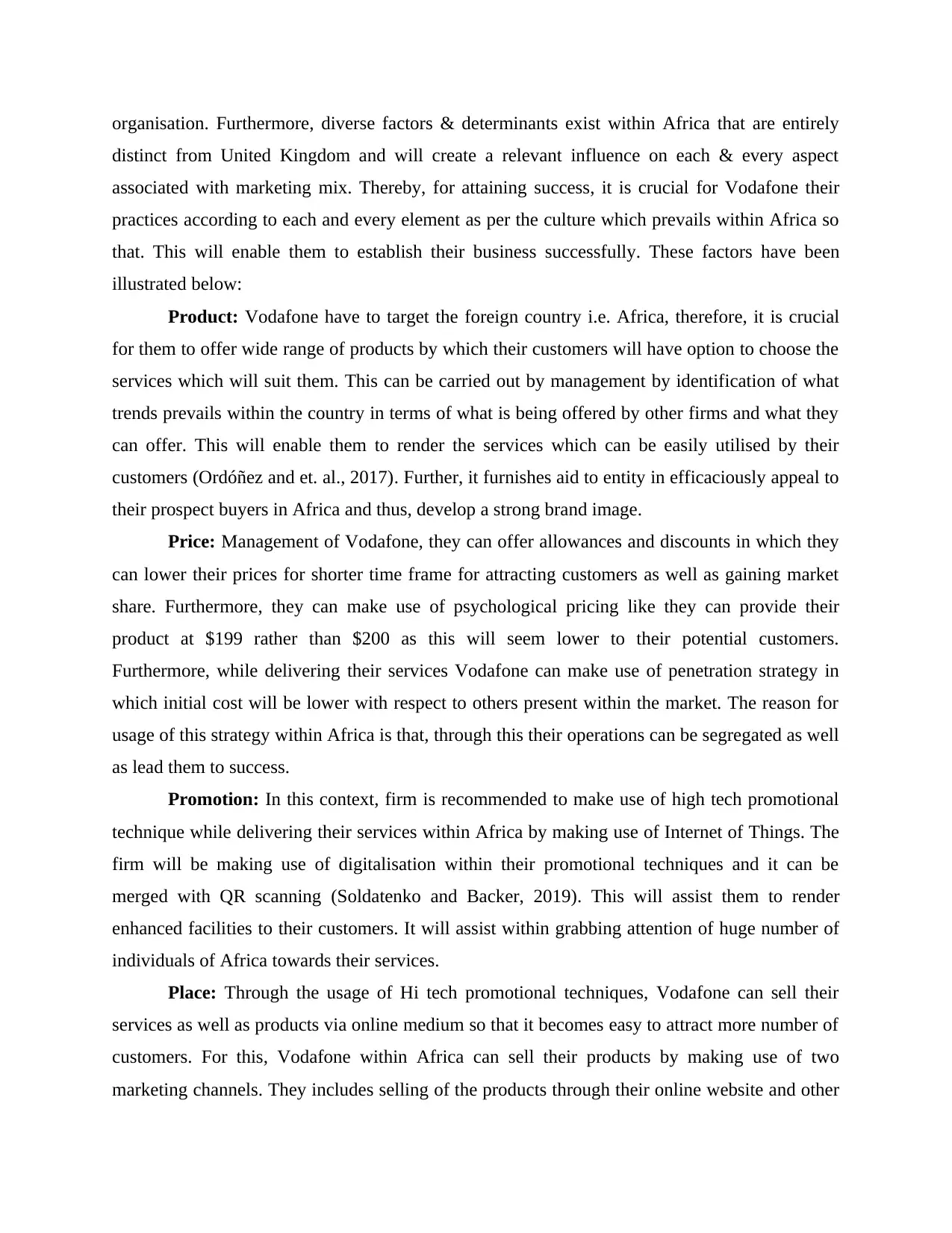
organisation. Furthermore, diverse factors & determinants exist within Africa that are entirely
distinct from United Kingdom and will create a relevant influence on each & every aspect
associated with marketing mix. Thereby, for attaining success, it is crucial for Vodafone their
practices according to each and every element as per the culture which prevails within Africa so
that. This will enable them to establish their business successfully. These factors have been
illustrated below:
Product: Vodafone have to target the foreign country i.e. Africa, therefore, it is crucial
for them to offer wide range of products by which their customers will have option to choose the
services which will suit them. This can be carried out by management by identification of what
trends prevails within the country in terms of what is being offered by other firms and what they
can offer. This will enable them to render the services which can be easily utilised by their
customers (Ordóñez and et. al., 2017). Further, it furnishes aid to entity in efficaciously appeal to
their prospect buyers in Africa and thus, develop a strong brand image.
Price: Management of Vodafone, they can offer allowances and discounts in which they
can lower their prices for shorter time frame for attracting customers as well as gaining market
share. Furthermore, they can make use of psychological pricing like they can provide their
product at $199 rather than $200 as this will seem lower to their potential customers.
Furthermore, while delivering their services Vodafone can make use of penetration strategy in
which initial cost will be lower with respect to others present within the market. The reason for
usage of this strategy within Africa is that, through this their operations can be segregated as well
as lead them to success.
Promotion: In this context, firm is recommended to make use of high tech promotional
technique while delivering their services within Africa by making use of Internet of Things. The
firm will be making use of digitalisation within their promotional techniques and it can be
merged with QR scanning (Soldatenko and Backer, 2019). This will assist them to render
enhanced facilities to their customers. It will assist within grabbing attention of huge number of
individuals of Africa towards their services.
Place: Through the usage of Hi tech promotional techniques, Vodafone can sell their
services as well as products via online medium so that it becomes easy to attract more number of
customers. For this, Vodafone within Africa can sell their products by making use of two
marketing channels. They includes selling of the products through their online website and other
distinct from United Kingdom and will create a relevant influence on each & every aspect
associated with marketing mix. Thereby, for attaining success, it is crucial for Vodafone their
practices according to each and every element as per the culture which prevails within Africa so
that. This will enable them to establish their business successfully. These factors have been
illustrated below:
Product: Vodafone have to target the foreign country i.e. Africa, therefore, it is crucial
for them to offer wide range of products by which their customers will have option to choose the
services which will suit them. This can be carried out by management by identification of what
trends prevails within the country in terms of what is being offered by other firms and what they
can offer. This will enable them to render the services which can be easily utilised by their
customers (Ordóñez and et. al., 2017). Further, it furnishes aid to entity in efficaciously appeal to
their prospect buyers in Africa and thus, develop a strong brand image.
Price: Management of Vodafone, they can offer allowances and discounts in which they
can lower their prices for shorter time frame for attracting customers as well as gaining market
share. Furthermore, they can make use of psychological pricing like they can provide their
product at $199 rather than $200 as this will seem lower to their potential customers.
Furthermore, while delivering their services Vodafone can make use of penetration strategy in
which initial cost will be lower with respect to others present within the market. The reason for
usage of this strategy within Africa is that, through this their operations can be segregated as well
as lead them to success.
Promotion: In this context, firm is recommended to make use of high tech promotional
technique while delivering their services within Africa by making use of Internet of Things. The
firm will be making use of digitalisation within their promotional techniques and it can be
merged with QR scanning (Soldatenko and Backer, 2019). This will assist them to render
enhanced facilities to their customers. It will assist within grabbing attention of huge number of
individuals of Africa towards their services.
Place: Through the usage of Hi tech promotional techniques, Vodafone can sell their
services as well as products via online medium so that it becomes easy to attract more number of
customers. For this, Vodafone within Africa can sell their products by making use of two
marketing channels. They includes selling of the products through their online website and other
Paraphrase This Document
Need a fresh take? Get an instant paraphrase of this document with our AI Paraphraser
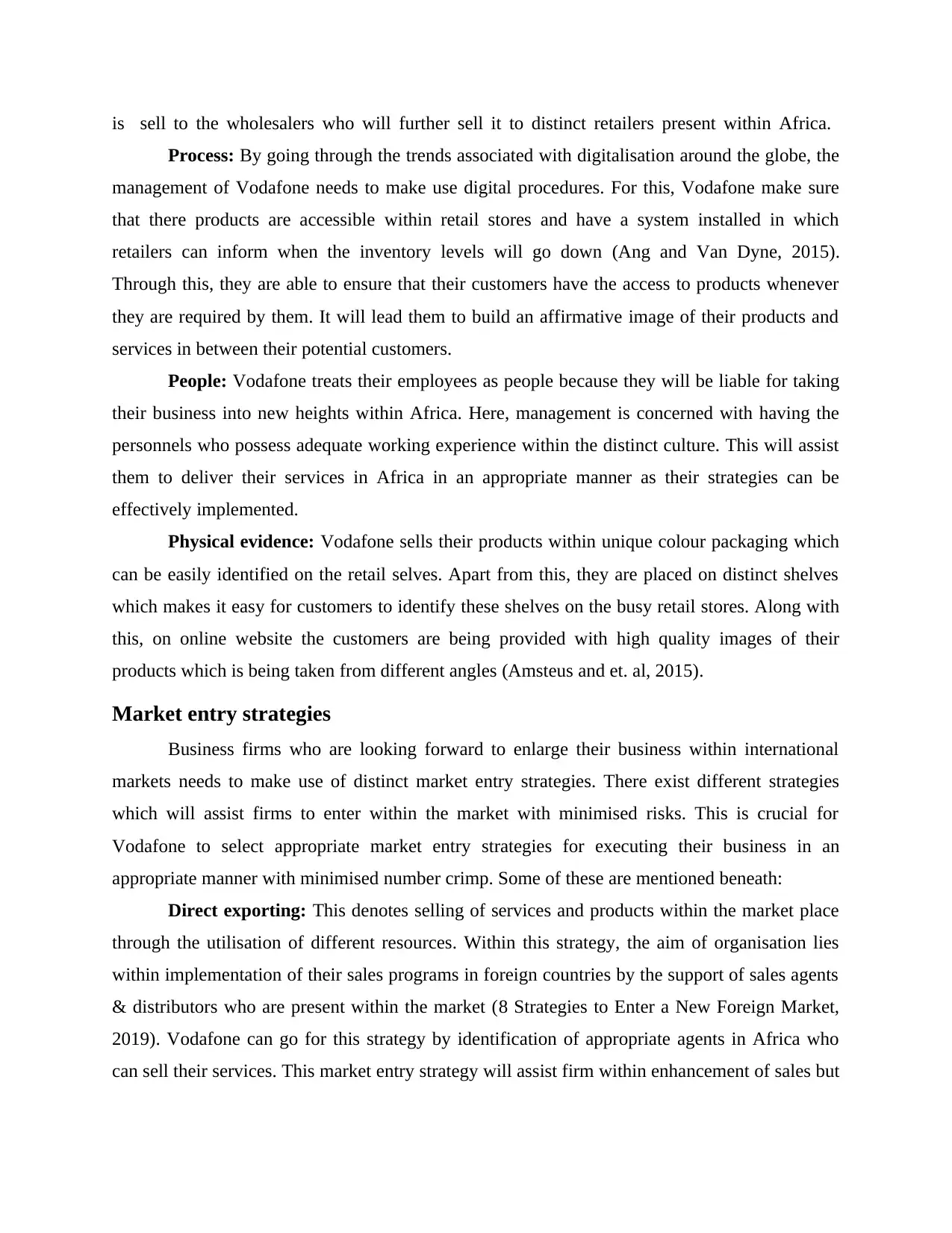
is sell to the wholesalers who will further sell it to distinct retailers present within Africa.
Process: By going through the trends associated with digitalisation around the globe, the
management of Vodafone needs to make use digital procedures. For this, Vodafone make sure
that there products are accessible within retail stores and have a system installed in which
retailers can inform when the inventory levels will go down (Ang and Van Dyne, 2015).
Through this, they are able to ensure that their customers have the access to products whenever
they are required by them. It will lead them to build an affirmative image of their products and
services in between their potential customers.
People: Vodafone treats their employees as people because they will be liable for taking
their business into new heights within Africa. Here, management is concerned with having the
personnels who possess adequate working experience within the distinct culture. This will assist
them to deliver their services in Africa in an appropriate manner as their strategies can be
effectively implemented.
Physical evidence: Vodafone sells their products within unique colour packaging which
can be easily identified on the retail selves. Apart from this, they are placed on distinct shelves
which makes it easy for customers to identify these shelves on the busy retail stores. Along with
this, on online website the customers are being provided with high quality images of their
products which is being taken from different angles (Amsteus and et. al, 2015).
Market entry strategies
Business firms who are looking forward to enlarge their business within international
markets needs to make use of distinct market entry strategies. There exist different strategies
which will assist firms to enter within the market with minimised risks. This is crucial for
Vodafone to select appropriate market entry strategies for executing their business in an
appropriate manner with minimised number crimp. Some of these are mentioned beneath:
Direct exporting: This denotes selling of services and products within the market place
through the utilisation of different resources. Within this strategy, the aim of organisation lies
within implementation of their sales programs in foreign countries by the support of sales agents
& distributors who are present within the market (8 Strategies to Enter a New Foreign Market,
2019). Vodafone can go for this strategy by identification of appropriate agents in Africa who
can sell their services. This market entry strategy will assist firm within enhancement of sales but
Process: By going through the trends associated with digitalisation around the globe, the
management of Vodafone needs to make use digital procedures. For this, Vodafone make sure
that there products are accessible within retail stores and have a system installed in which
retailers can inform when the inventory levels will go down (Ang and Van Dyne, 2015).
Through this, they are able to ensure that their customers have the access to products whenever
they are required by them. It will lead them to build an affirmative image of their products and
services in between their potential customers.
People: Vodafone treats their employees as people because they will be liable for taking
their business into new heights within Africa. Here, management is concerned with having the
personnels who possess adequate working experience within the distinct culture. This will assist
them to deliver their services in Africa in an appropriate manner as their strategies can be
effectively implemented.
Physical evidence: Vodafone sells their products within unique colour packaging which
can be easily identified on the retail selves. Apart from this, they are placed on distinct shelves
which makes it easy for customers to identify these shelves on the busy retail stores. Along with
this, on online website the customers are being provided with high quality images of their
products which is being taken from different angles (Amsteus and et. al, 2015).
Market entry strategies
Business firms who are looking forward to enlarge their business within international
markets needs to make use of distinct market entry strategies. There exist different strategies
which will assist firms to enter within the market with minimised risks. This is crucial for
Vodafone to select appropriate market entry strategies for executing their business in an
appropriate manner with minimised number crimp. Some of these are mentioned beneath:
Direct exporting: This denotes selling of services and products within the market place
through the utilisation of different resources. Within this strategy, the aim of organisation lies
within implementation of their sales programs in foreign countries by the support of sales agents
& distributors who are present within the market (8 Strategies to Enter a New Foreign Market,
2019). Vodafone can go for this strategy by identification of appropriate agents in Africa who
can sell their services. This market entry strategy will assist firm within enhancement of sales but
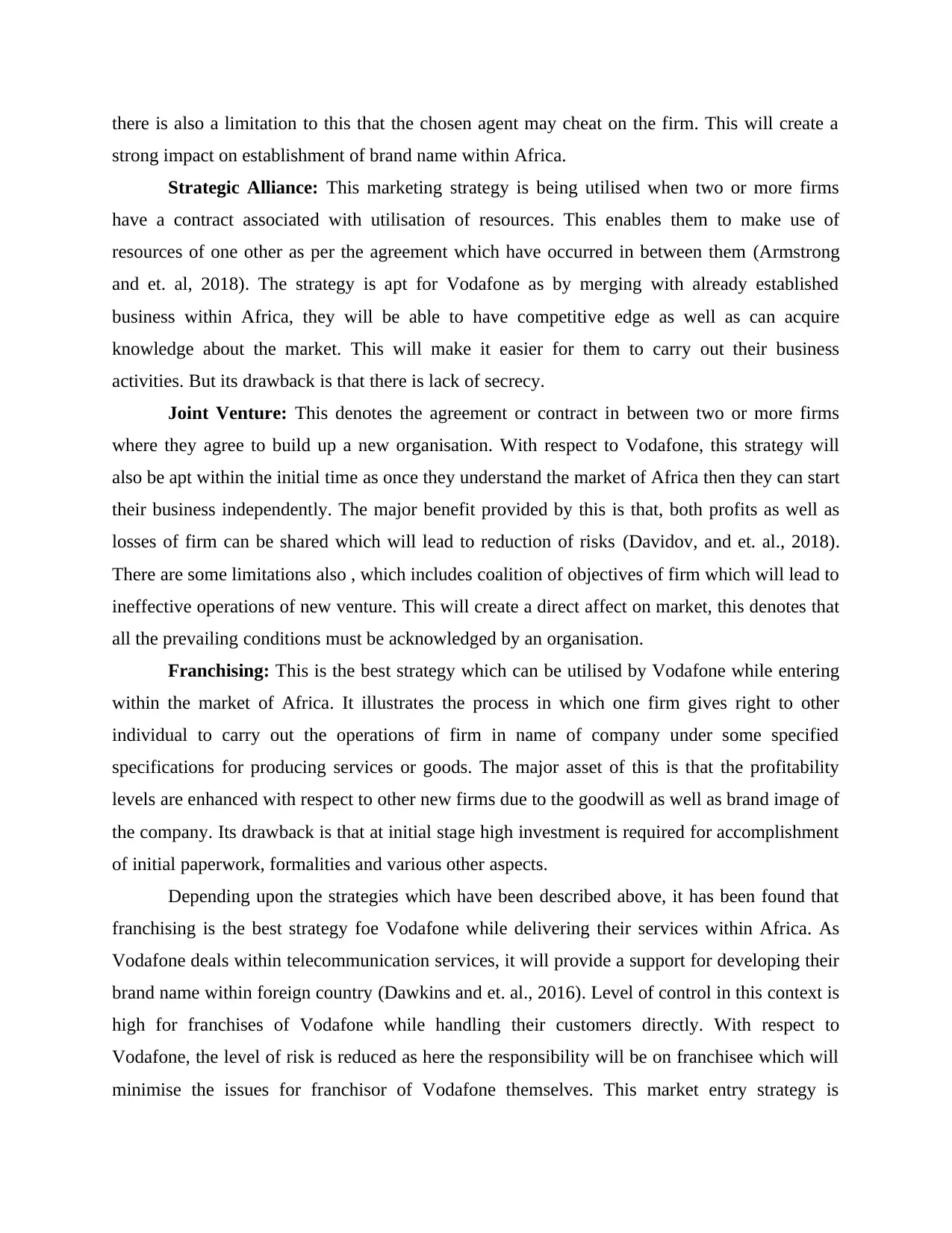
there is also a limitation to this that the chosen agent may cheat on the firm. This will create a
strong impact on establishment of brand name within Africa.
Strategic Alliance: This marketing strategy is being utilised when two or more firms
have a contract associated with utilisation of resources. This enables them to make use of
resources of one other as per the agreement which have occurred in between them (Armstrong
and et. al, 2018). The strategy is apt for Vodafone as by merging with already established
business within Africa, they will be able to have competitive edge as well as can acquire
knowledge about the market. This will make it easier for them to carry out their business
activities. But its drawback is that there is lack of secrecy.
Joint Venture: This denotes the agreement or contract in between two or more firms
where they agree to build up a new organisation. With respect to Vodafone, this strategy will
also be apt within the initial time as once they understand the market of Africa then they can start
their business independently. The major benefit provided by this is that, both profits as well as
losses of firm can be shared which will lead to reduction of risks (Davidov, and et. al., 2018).
There are some limitations also , which includes coalition of objectives of firm which will lead to
ineffective operations of new venture. This will create a direct affect on market, this denotes that
all the prevailing conditions must be acknowledged by an organisation.
Franchising: This is the best strategy which can be utilised by Vodafone while entering
within the market of Africa. It illustrates the process in which one firm gives right to other
individual to carry out the operations of firm in name of company under some specified
specifications for producing services or goods. The major asset of this is that the profitability
levels are enhanced with respect to other new firms due to the goodwill as well as brand image of
the company. Its drawback is that at initial stage high investment is required for accomplishment
of initial paperwork, formalities and various other aspects.
Depending upon the strategies which have been described above, it has been found that
franchising is the best strategy foe Vodafone while delivering their services within Africa. As
Vodafone deals within telecommunication services, it will provide a support for developing their
brand name within foreign country (Dawkins and et. al., 2016). Level of control in this context is
high for franchises of Vodafone while handling their customers directly. With respect to
Vodafone, the level of risk is reduced as here the responsibility will be on franchisee which will
minimise the issues for franchisor of Vodafone themselves. This market entry strategy is
strong impact on establishment of brand name within Africa.
Strategic Alliance: This marketing strategy is being utilised when two or more firms
have a contract associated with utilisation of resources. This enables them to make use of
resources of one other as per the agreement which have occurred in between them (Armstrong
and et. al, 2018). The strategy is apt for Vodafone as by merging with already established
business within Africa, they will be able to have competitive edge as well as can acquire
knowledge about the market. This will make it easier for them to carry out their business
activities. But its drawback is that there is lack of secrecy.
Joint Venture: This denotes the agreement or contract in between two or more firms
where they agree to build up a new organisation. With respect to Vodafone, this strategy will
also be apt within the initial time as once they understand the market of Africa then they can start
their business independently. The major benefit provided by this is that, both profits as well as
losses of firm can be shared which will lead to reduction of risks (Davidov, and et. al., 2018).
There are some limitations also , which includes coalition of objectives of firm which will lead to
ineffective operations of new venture. This will create a direct affect on market, this denotes that
all the prevailing conditions must be acknowledged by an organisation.
Franchising: This is the best strategy which can be utilised by Vodafone while entering
within the market of Africa. It illustrates the process in which one firm gives right to other
individual to carry out the operations of firm in name of company under some specified
specifications for producing services or goods. The major asset of this is that the profitability
levels are enhanced with respect to other new firms due to the goodwill as well as brand image of
the company. Its drawback is that at initial stage high investment is required for accomplishment
of initial paperwork, formalities and various other aspects.
Depending upon the strategies which have been described above, it has been found that
franchising is the best strategy foe Vodafone while delivering their services within Africa. As
Vodafone deals within telecommunication services, it will provide a support for developing their
brand name within foreign country (Dawkins and et. al., 2016). Level of control in this context is
high for franchises of Vodafone while handling their customers directly. With respect to
Vodafone, the level of risk is reduced as here the responsibility will be on franchisee which will
minimise the issues for franchisor of Vodafone themselves. This market entry strategy is
⊘ This is a preview!⊘
Do you want full access?
Subscribe today to unlock all pages.

Trusted by 1+ million students worldwide
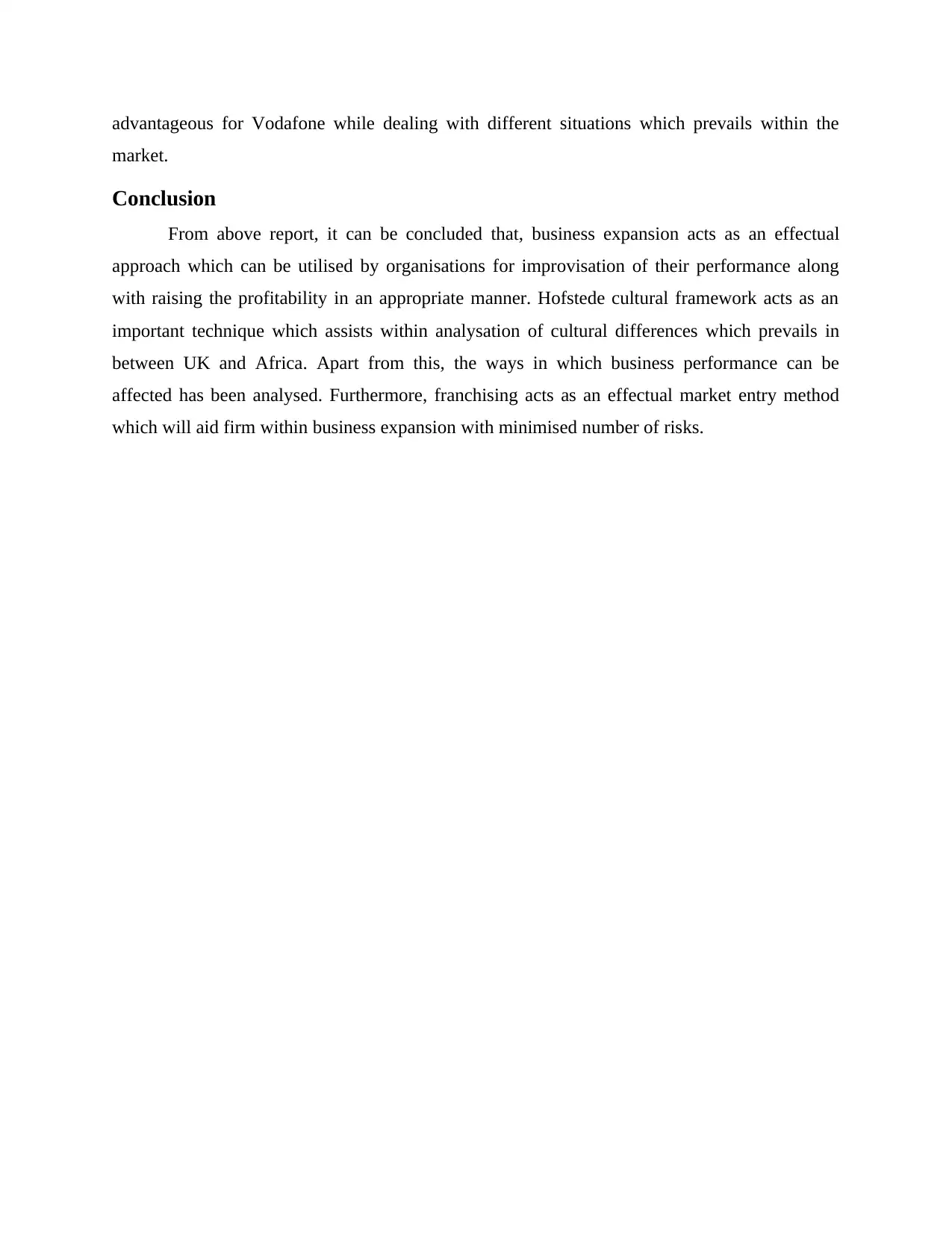
advantageous for Vodafone while dealing with different situations which prevails within the
market.
Conclusion
From above report, it can be concluded that, business expansion acts as an effectual
approach which can be utilised by organisations for improvisation of their performance along
with raising the profitability in an appropriate manner. Hofstede cultural framework acts as an
important technique which assists within analysation of cultural differences which prevails in
between UK and Africa. Apart from this, the ways in which business performance can be
affected has been analysed. Furthermore, franchising acts as an effectual market entry method
which will aid firm within business expansion with minimised number of risks.
market.
Conclusion
From above report, it can be concluded that, business expansion acts as an effectual
approach which can be utilised by organisations for improvisation of their performance along
with raising the profitability in an appropriate manner. Hofstede cultural framework acts as an
important technique which assists within analysation of cultural differences which prevails in
between UK and Africa. Apart from this, the ways in which business performance can be
affected has been analysed. Furthermore, franchising acts as an effectual market entry method
which will aid firm within business expansion with minimised number of risks.
Paraphrase This Document
Need a fresh take? Get an instant paraphrase of this document with our AI Paraphraser
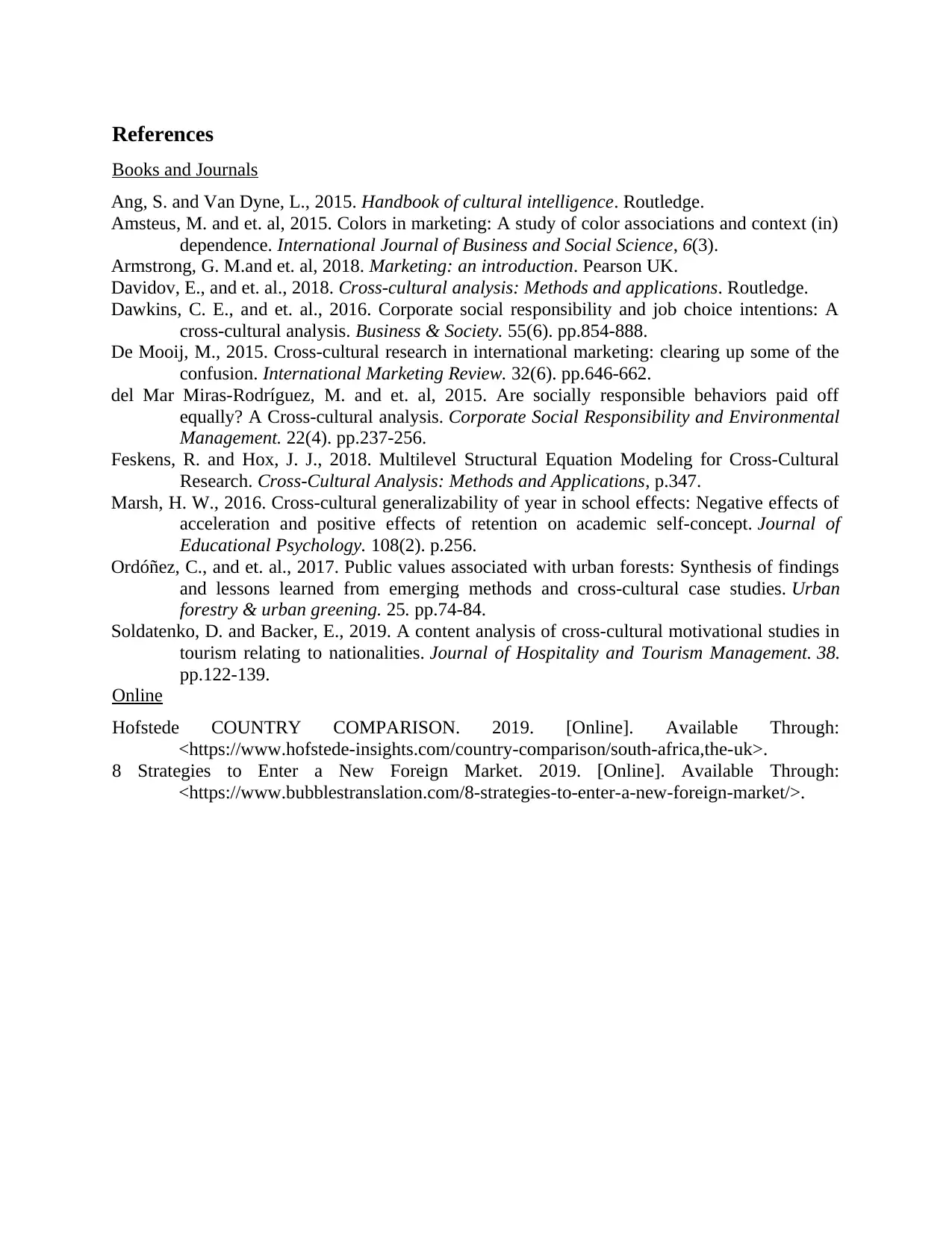
References
Books and Journals
Ang, S. and Van Dyne, L., 2015. Handbook of cultural intelligence. Routledge.
Amsteus, M. and et. al, 2015. Colors in marketing: A study of color associations and context (in)
dependence. International Journal of Business and Social Science, 6(3).
Armstrong, G. M.and et. al, 2018. Marketing: an introduction. Pearson UK.
Davidov, E., and et. al., 2018. Cross-cultural analysis: Methods and applications. Routledge.
Dawkins, C. E., and et. al., 2016. Corporate social responsibility and job choice intentions: A
cross-cultural analysis. Business & Society. 55(6). pp.854-888.
De Mooij, M., 2015. Cross-cultural research in international marketing: clearing up some of the
confusion. International Marketing Review. 32(6). pp.646-662.
del Mar Miras‐Rodríguez, M. and et. al, 2015. Are socially responsible behaviors paid off
equally? A Cross‐cultural analysis. Corporate Social Responsibility and Environmental
Management. 22(4). pp.237-256.
Feskens, R. and Hox, J. J., 2018. Multilevel Structural Equation Modeling for Cross-Cultural
Research. Cross-Cultural Analysis: Methods and Applications, p.347.
Marsh, H. W., 2016. Cross-cultural generalizability of year in school effects: Negative effects of
acceleration and positive effects of retention on academic self-concept. Journal of
Educational Psychology. 108(2). p.256.
Ordóñez, C., and et. al., 2017. Public values associated with urban forests: Synthesis of findings
and lessons learned from emerging methods and cross-cultural case studies. Urban
forestry & urban greening. 25. pp.74-84.
Soldatenko, D. and Backer, E., 2019. A content analysis of cross-cultural motivational studies in
tourism relating to nationalities. Journal of Hospitality and Tourism Management. 38.
pp.122-139.
Online
Hofstede COUNTRY COMPARISON. 2019. [Online]. Available Through:
<https://www.hofstede-insights.com/country-comparison/south-africa,the-uk>.
8 Strategies to Enter a New Foreign Market. 2019. [Online]. Available Through:
<https://www.bubblestranslation.com/8-strategies-to-enter-a-new-foreign-market/>.
Books and Journals
Ang, S. and Van Dyne, L., 2015. Handbook of cultural intelligence. Routledge.
Amsteus, M. and et. al, 2015. Colors in marketing: A study of color associations and context (in)
dependence. International Journal of Business and Social Science, 6(3).
Armstrong, G. M.and et. al, 2018. Marketing: an introduction. Pearson UK.
Davidov, E., and et. al., 2018. Cross-cultural analysis: Methods and applications. Routledge.
Dawkins, C. E., and et. al., 2016. Corporate social responsibility and job choice intentions: A
cross-cultural analysis. Business & Society. 55(6). pp.854-888.
De Mooij, M., 2015. Cross-cultural research in international marketing: clearing up some of the
confusion. International Marketing Review. 32(6). pp.646-662.
del Mar Miras‐Rodríguez, M. and et. al, 2015. Are socially responsible behaviors paid off
equally? A Cross‐cultural analysis. Corporate Social Responsibility and Environmental
Management. 22(4). pp.237-256.
Feskens, R. and Hox, J. J., 2018. Multilevel Structural Equation Modeling for Cross-Cultural
Research. Cross-Cultural Analysis: Methods and Applications, p.347.
Marsh, H. W., 2016. Cross-cultural generalizability of year in school effects: Negative effects of
acceleration and positive effects of retention on academic self-concept. Journal of
Educational Psychology. 108(2). p.256.
Ordóñez, C., and et. al., 2017. Public values associated with urban forests: Synthesis of findings
and lessons learned from emerging methods and cross-cultural case studies. Urban
forestry & urban greening. 25. pp.74-84.
Soldatenko, D. and Backer, E., 2019. A content analysis of cross-cultural motivational studies in
tourism relating to nationalities. Journal of Hospitality and Tourism Management. 38.
pp.122-139.
Online
Hofstede COUNTRY COMPARISON. 2019. [Online]. Available Through:
<https://www.hofstede-insights.com/country-comparison/south-africa,the-uk>.
8 Strategies to Enter a New Foreign Market. 2019. [Online]. Available Through:
<https://www.bubblestranslation.com/8-strategies-to-enter-a-new-foreign-market/>.
1 out of 11
Related Documents
Your All-in-One AI-Powered Toolkit for Academic Success.
+13062052269
info@desklib.com
Available 24*7 on WhatsApp / Email
![[object Object]](/_next/static/media/star-bottom.7253800d.svg)
Unlock your academic potential
Copyright © 2020–2025 A2Z Services. All Rights Reserved. Developed and managed by ZUCOL.





